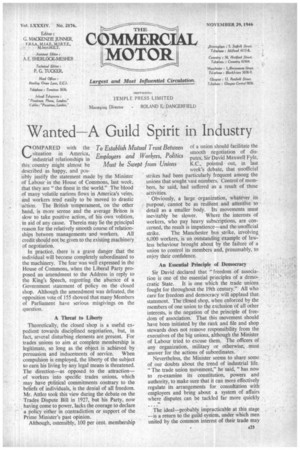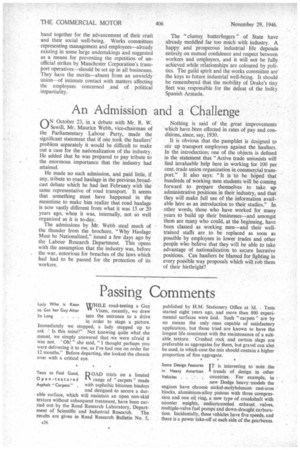Wanted A Guild Spirit in Industry
Page 27

Page 28

If you've noticed an error in this article please click here to report it so we can fix it.
COMPARED with the situation in America, industrial relationships in this country might almost be described as happy, and possibly justify the statement made by the Minister of Labour in the House of Commons, last week, that they are "the finest in the world." The blood of many volatile nations flows in America's veins, and workers tend easily to be moved to drastic . action. The British temperament, on the other hand, is more serene and the average Briton is slow to take positive action, of his own volition, in aid of any cause. Therein may lie the principal reason for the relatively smooth course of relationships between managements and workers. All credit should not be given to the existing machinery of negotiation.
In practice, there is a grave danger that the individual will become completely subordinated to the machinery. The fear was well expressed in the House of Commons, when the Liberal Party proposed an amendment to the Address in reply to the King's Speech, regretting the absence of a Government statement of policy on the closed shop. Although the amendment was defeated, the opposition vote of 155 showed that many Members of Parliament have serious misgivings on the question.
A Threat to Liberty Theoretically, the closed shop is a useful expedient towards disciplined negotiation, but, in fact, several disturbing elements are present. For trades unions to aim at complete membership is legitimate, so long as the object is achieved by persuasion and inducements of service. When compulsion is employed, the liberty of the subject to earn his living by any legal means is threatened. The direction—as opposed to the attraction— of workers into specific trades unions, which may have political commitments contrary to the beliefs of individuals, is the denial of all freedom. Mr. Attlee took this view during the debate on the Trades Dispute Bill in 1927, but his Party, now having come to power, lacks the courage to declare a policy either in contradiction or support of the Prime Minister's past opinion.
Although, ostensibly, 100 per cent. membership of a union should facilitate the smooth negotiation of disputes, Sir David Maxwell Fyfe, K.C., pointed out, in last week's debate, that unofficial strikes had been particularly frequent among the unions that sought vast numbers. Control of members, he said, had suffered as a result of these activities.
Obviously, a large organization, whatever its purpose, cannot be as resilient and attentive to detail as a smaller body. Its movements must inevitably be slower. Where the interests of workers, who pay heavy subscriptions, are concerned, the result is impatience—and the .unofficial strike. The Manchester bus strike, involving 6000 workers, is an outstanding example of lawless behaviour brought about by the failure of a union to control its members and, presumably, to enjoy their confidence.
An Essential Principle of Democracy Sir David declared that "freedom of association is one of the essential principles of a demo cratic State. It is one which the trade unions fought for throughout the 19th century." All who care for freedom and democracy will applaud that statement. The dosed shop, when enforced by the members of one union to the exclusion of all other interests, is the negation of the principle of freedom of association. That this movement should have been initiated by the rank and file and shop stewards does not remove responsibility from the executives of the big unions, although the Minister of Labour tried to excuse them. The officers of any organization, military or otherwise, must answer for the actions of subordinates.
Nevertheless, the Minister seems to share some of our doubts about the trend of industrial life. "The trade union movement," he said, "has now to re-examine its constitution, powers and authority, to make sure that it can more effectively regulate its arrangements for consultation with employers and bring about a system of affairs where disputes can be tackled far more quickly The ideal—probably impracticable at this stage —is a return to the guild system, under which men united by the common interest of their trade may band together for the advancement of their craft and their social well-being. Works committees representing management and employees—already existing in some large undertakings and suggested as a means for preventing the repetition of unofficial strikes by Manchester Corporation's transport operatives—should be set up in all businesses. They have the merits—absent from an unwieldy • union—of intimate contact with matters affecting the employees concerned and of political impartiality. The "clumsy butterfingers" of State have already meddled far too much with industry. A happy and prosperous industrial life dependg entirely on mutual confidence and respect between workers and employers, and it will not be fully achieved while relationships are coloured by politics. The guild spirit and the works committee are the keys to future industrial well-being. It should be remembered that the mobility of Drake's tiny fleet was responsible for the defeat of the bulky Spanish Armada.
























































































